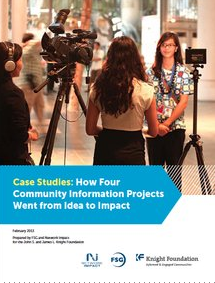
Using environmental info to spark action
Above: The Mississippi Riverwalk in Dubuque, Iowa. Photo credit: Flickr user Mac9001.
Facing high unemployment and a collapse of local manufacturing, the city of Dubuque, Iowa made a conscious effort to rebrand itself as a forward-looking city. Part of its charge included taking on environmental sustainability as a top priority.
Leaders recognized early on the connection between sustainability and a strong economic sector. As its Mayor Mayor Ron Buol said, “cities that get out in front on sustainability will have competitive economic advantages in the future.” So as a winner of the Knight Community Information Challenge, the Community Foundation of Greater Dubuque seized an opportunity to spark action. Its project sought to work with the city and inspire local citizens to conserve energy, use less water and adopt other environmentally friendly practices. Knight recently talked with the community foundation’s Vice President of Programs, Eric Dregne, about how it used a creative approach to engage residents in conserving the environment and how it leveraged existing programs. You can also read out more about its approach in a new case study. RELATED LINK
You honed in on the idea that data really is personal by allowing people to anonymously snoop on their neighbors to compare their water usage. How do you think that motivated the community? E.D: Having personal data made it more relevant to everyone who participated. Not only was the data people were looking at their data, but they could also see data from people like them in the community. People found this to be very motivating. Seeing data that you know is on a “level playing field” such as water data from a similar family, let participants know that they could get similar results…and so they tried to do just that. What role did online and offline games play in the project? Do you think they were the strongest tactic you used? If not, what was? E.D: Games were effective to bring attention to the project but were not the strongest tactic. The games were very effective for initial engagement and connecting people to the issue in a fun way. Longer lasting engagement came from high-touch efforts like Community Café events where people were invited to participate in live discussions with others about a particular piece of the community sustainability effort. Also people were more deeply engaged by the platforms that shared their data with them, again because the information was extremely relevant. Dubuque2.0 is being integrated into Sustainable Dubuque – the campaign launched by City Hall – rather than remain a separate entity. How was this decision was made? E.D: Integrating Dubuque 2.0 into Sustainable Dubuque has become a really natural decision. We began by working together as partners in “specialty roles” to promote a more sustainable Dubuque. The City’s Sustainable Dubuque initiative was focused on the data aspect of creating a sustainable community and had a strong platform to build on, while Dubuque 2.0 was focused on engaging community members in the broader issue of sustainability. We worked together to create a platform where the community could engage at any level, from people who just want to know more about sustainability to people who love anything green and want to know how they can measure what they are doing and share what they know with others. As we continued, we saw that our initiatives could be more sustainable by combining the best of each partners work to ensure a sustainable community in the long term. This has now led to a single effort called Sustainable Dubuque. What are some of the most significant ways in which your community changed throughout this process? E.D.: The community is more engaged in sustainability for starters. More people understand the issue, more ideas and initiatives are getting implemented to promote a sustainable community. In addition, partnerships between the community foundation, local government, and non-profits in this space have been strengthened. Finally, the community foundation built its capacity to take on challenging issues at a community level.
Recent Content
-
Communitiesarticle ·
-
Communitiesarticle ·
-
Communitiesarticle ·



